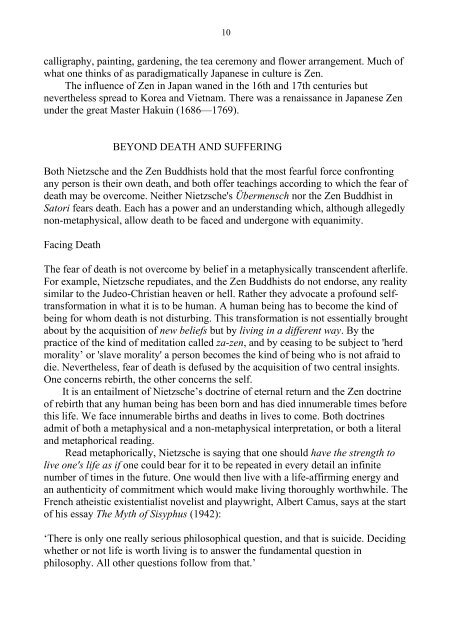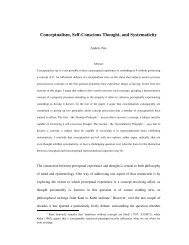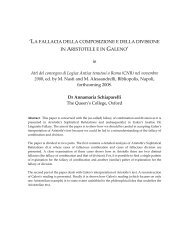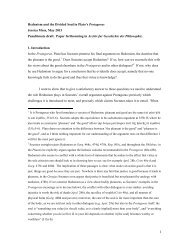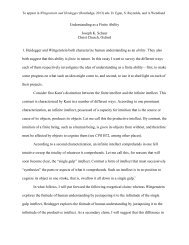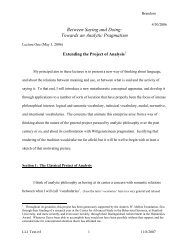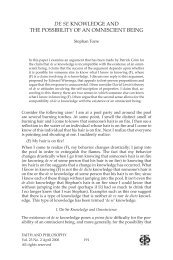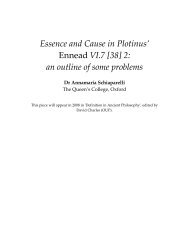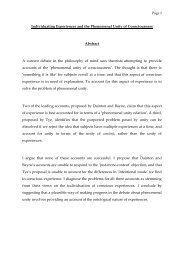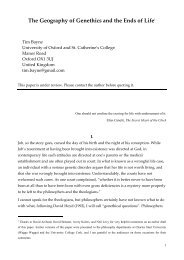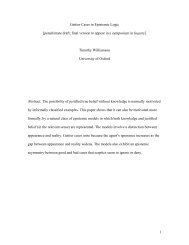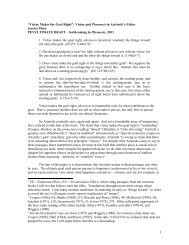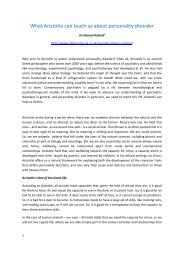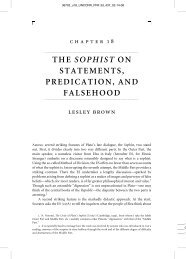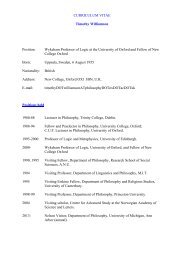Say who everyone is as you go along - Faculty of Philosophy ...
Say who everyone is as you go along - Faculty of Philosophy ...
Say who everyone is as you go along - Faculty of Philosophy ...
Create successful ePaper yourself
Turn your PDF publications into a flip-book with our unique Google optimized e-Paper software.
10<br />
calligraphy, painting, gardening, the tea ceremony and flower arrangement. Much <strong>of</strong><br />
what one thinks <strong>of</strong> <strong>as</strong> paradigmatically Japanese in culture <strong>is</strong> Zen.<br />
The influence <strong>of</strong> Zen in Japan waned in the 16th and 17th centuries but<br />
nevertheless spread to Korea and Vietnam. There w<strong>as</strong> a rena<strong>is</strong>sance in Japanese Zen<br />
under the great M<strong>as</strong>ter Hakuin (1686—1769).<br />
BEYOND DEATH AND SUFFERING<br />
Both Nietzsche and the Zen Buddh<strong>is</strong>ts hold that the most fearful force confronting<br />
any person <strong>is</strong> their own death, and both <strong>of</strong>fer teachings according to which the fear <strong>of</strong><br />
death may be overcome. Neither Nietzsche's Übermensch nor the Zen Buddh<strong>is</strong>t in<br />
Satori fears death. Each h<strong>as</strong> a power and an understanding which, although allegedly<br />
non-metaphysical, allow death to be faced and under<strong>go</strong>ne with equanimity.<br />
Facing Death<br />
The fear <strong>of</strong> death <strong>is</strong> not overcome by belief in a metaphysically transcendent afterlife.<br />
For example, Nietzsche repudiates, and the Zen Buddh<strong>is</strong>ts do not endorse, any reality<br />
similar to the Judeo-Chr<strong>is</strong>tian heaven or hell. Rather they advocate a pr<strong>of</strong>ound selftransformation<br />
in what it <strong>is</strong> to be human. A human being h<strong>as</strong> to become the kind <strong>of</strong><br />
being for <strong>who</strong>m death <strong>is</strong> not d<strong>is</strong>turbing. Th<strong>is</strong> transformation <strong>is</strong> not essentially brought<br />
about by the acqu<strong>is</strong>ition <strong>of</strong> new beliefs but by living in a different way. By the<br />
practice <strong>of</strong> the kind <strong>of</strong> meditation called za-zen, and by ce<strong>as</strong>ing to be subject to 'herd<br />
morality’ or 'slave morality' a person becomes the kind <strong>of</strong> being <strong>who</strong> <strong>is</strong> not afraid to<br />
die. Nevertheless, fear <strong>of</strong> death <strong>is</strong> defused by the acqu<strong>is</strong>ition <strong>of</strong> two central insights.<br />
One concerns rebirth, the other concerns the self.<br />
It <strong>is</strong> an entailment <strong>of</strong> Nietzsche’s doctrine <strong>of</strong> eternal return and the Zen doctrine<br />
<strong>of</strong> rebirth that any human being h<strong>as</strong> been born and h<strong>as</strong> died innumerable times before<br />
th<strong>is</strong> life. We face innumerable births and deaths in lives to come. Both doctrines<br />
admit <strong>of</strong> both a metaphysical and a non-metaphysical interpretation, or both a literal<br />
and metaphorical reading.<br />
Read metaphorically, Nietzsche <strong>is</strong> saying that one should have the strength to<br />
live one's life <strong>as</strong> if one could bear for it to be repeated in every detail an infinite<br />
number <strong>of</strong> times in the future. One would then live with a life-affirming energy and<br />
an authenticity <strong>of</strong> commitment which would make living thoroughly worthwhile. The<br />
French athe<strong>is</strong>tic ex<strong>is</strong>tential<strong>is</strong>t novel<strong>is</strong>t and playwright, Albert Camus, says at the start<br />
<strong>of</strong> h<strong>is</strong> essay The Myth <strong>of</strong> S<strong>is</strong>yphus (1942):<br />
‘There <strong>is</strong> only one really serious philosophical question, and that <strong>is</strong> suicide. Deciding<br />
whether or not life <strong>is</strong> worth living <strong>is</strong> to answer the fundamental question in<br />
philosophy. All other questions follow from that.’


